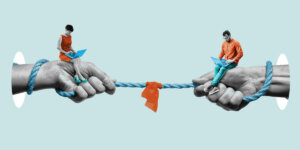
Kristina Lerman’s research group studied resource-depletion in connection to test-taking. Photo / istock
Might power naps enhance performance? Perhaps. Short breaks sure do. That is the finding of research by Kristina Lerman, principal scientist at the USC Information Sciences Institute and research associate professor in the USC Viterbi School of Engineering’s Department of Computer Science.
Lerman, along with lead author Nathan O. Hodas, and co-authors Jacob Hunter, and Stephen J. Young, reviewed 2.8 million attempts by 180 thousand users to answer 6,000 SAT, ACT, and GED test questions on the website grockit.com, evaluating the intervals between the stop and start time of the students’ attempts to solve problems and learn from mistakes. Their study, published the Journal of Computational Social Science, puts forth a model to understand factors at play in performance.
Similar to models previously employed to understand energy metabolism in the brain, the USC team’s model focuses on the concept of resource depletion. In this case, the researchers’ premise is that the mere act of answering questions itself depletes the brain the resources it needs for performance.
Their paper, “Model of Cognitive Dynamics Predicts Performance on Standardized Tests” states, “the mere act of answering test questions impair performance and the ability to learn correct answers.”
The data shows that the longer test takers focused on a task, the more their cognitive resources were “depleted by sustained mental effort.”
What is a test-taker to do? Take breaks. The authors say, “Performance declines over the course of a test taking session, it recovers following prolonged breaks between sessions.”
And the researchers suggest that when you do return to whatever task you are doing, that you should warm up of an easier task before starting a more complicated task.
This body of work has implications not just for test-taking, the researchers say, but for the start of the work week. One should start with something easier such as an email before going onto bigger, more complex tasks that require intense concentration.
“Thinking requires energy in the brain. As you think, you deplete this energy, which makes thinking even harder. You are more likely to make mistakes when your brain gets tired,” says Lerman.
“You are more likely to make mistakes at the end of the test, when your brain is tired because it used up all its energy, than at the beginning of the test. It is like doing any physical activity – it’s like when someone takes one last run last run at the ski area. The person always get hurt doing that ‘one last run’. You get hurt because your body is tired from physical exertion of skiing. Thinking is like that too.”
Published on December 10th, 2018
Last updated on May 20th, 2021








